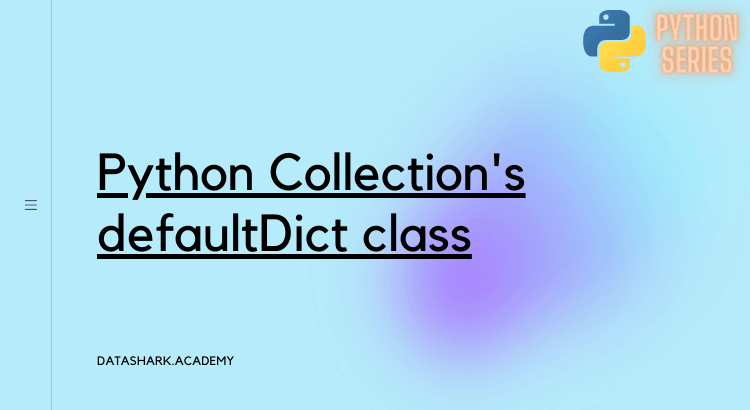The defaultdict class in Python’s collections module is a subclass of the built-in dict class that provides a convenient way to specify default values for keys that have not been explicitly set. In this article, we will discuss how to use the defaultdict class, along with code examples.
Creating a defaultdict object
To create a defaultdict object, we first need to import it from the collections module:
from collections import defaultdict
We can then create a defaultdict object by specifying a default factory function that will be used to generate default values for keys that have not been explicitly set. The default factory function can be any callable object that takes no arguments and returns a default value.
For example, to create a defaultdict object that generates a default value of 0 for any missing keys, we can use the built-in int function as the default factory function:
d = defaultdict(int)
Now, any missing keys in d will be automatically initialized to 0 when accessed:
>>> d = defaultdict(int)
>>> d['a'] += 1
>>> d['b'] += 2
>>> d
defaultdict(<class 'int'>, {'a': 1, 'b': 2})
>>> d['c']
0
>>> d
defaultdict(<class 'int'>, {'a': 1, 'b': 2, 'c': 0})
In this example, we access the keys 'a' and 'b' using the += operator to increment their values. Since the key 'c' has not been explicitly set, accessing it returns the default value of 0, which is then added to the dictionary with key 'c'.
Using custom factory functions
We can also use custom factory functions to generate default values for missing keys. For example, to create a defaultdict object that generates a default value of an empty list for any missing keys, we can use the built-in list function as the default factory function:
d = defaultdict(list)
Now, any missing keys in d will be automatically initialized to an empty list when accessed:
>>> d = defaultdict(list)
>>> d['a'].append(1)
>>> d['b'].extend([2, 3])
>>> d
defaultdict(<class 'list'>, {'a': [1], 'b': [2, 3]})
>>> d['c']
[]
>>> d
defaultdict(<class 'list'>, {'a': [1], 'b': [2, 3], 'c': []})
In this example, we access the keys 'a' and 'b' using the append and extend methods, respectively. Since the key 'c' has not been explicitly set, accessing it returns the default value of an empty list, which is then added to the dictionary with key 'c'.
We can also use lambda functions to create custom factory functions on-the-fly. For example, to create a defaultdict object that generates a default value of None for any missing keys, we can use a lambda function as the default factory function:
d = defaultdict(lambda: None)
Now, any missing keys in d will be automatically initialized to None when accessed:
>>> d = defaultdict(lambda: None)
>>> d['a'] = 1
>>> d['b'] = 'two'
>>> d
defaultdict(<function <lambda> at 0x7f991dd7c8b0
When not to use defaultDict
While defaultdict can be very useful in certain scenarios, there are some situations where it may not be the best choice.
One such situation is when you need to perform operations on the keys or values of the dictionary, such as sorting or filtering. Since defaultdict automatically initializes missing keys with default values, it may not be easy to differentiate between keys that have been explicitly set and keys that have been initialized with default values. In such cases, it may be better to use a regular dictionary and initialize missing keys manually.
Another situation is when you need to use a custom factory function that is expensive to compute. Since the factory function is called every time a missing key is accessed, using an expensive factory function can lead to performance issues. In such cases, it may be better to use a regular dictionary and initialize missing keys lazily, as needed.
Finally, if you are working with a small or fixed set of keys, it may be more efficient to use a regular dictionary and initialize all keys upfront, rather than relying on defaultdict to initialize missing keys as needed. This can save memory and improve performance, especially for large dictionaries.
What are in-built functions supported on defaultDict
defaultdict is a subclass of the built-in dict class, so it inherits all the methods and properties of dict. In addition, defaultdict provides a few extra methods and properties that are specific to its functionality:
default_factory: This property returns the default factory function used by thedefaultdictobject.__missing__(key): This method is called bydictwhen a missing key is accessed. Indefaultdict, it returns the default value generated by the default factory function.copy(): This method returns a shallow copy of thedefaultdictobject.fromkeys(iterable, value=None): This method returns a newdefaultdictobject initialized with the keys from the given iterable and the given value as the default value.items(): This method returns a view object that contains the key-value pairs of thedefaultdictobject.keys(): This method returns a view object that contains the keys of thedefaultdictobject.pop(key[, default]): This method removes and returns the value associated with the given key. If the key is not found and a default value is specified, the default value is returned instead.popitem(): This method removes and returns an arbitrary key-value pair from thedefaultdictobject.setdefault(key[, default]): This method returns the value associated with the given key, or sets the key to the default value and returns the default value if the key is not found.update([other, ]**kwargs): This method updates thedefaultdictobject with the key-value pairs from the givendictor keyword arguments.values(): This method returns a view object that contains the values of thedefaultdictobject.
These methods and properties can be used to manipulate and access the key-value pairs of a defaultdict object in various ways, just like a regular dict.
In summary, defaultdict is a powerful tool for working with dictionaries in Python, but it is not always the best choice for every situation. It is important to consider the specific requirements of your application and choose the appropriate data structure accordingly.

